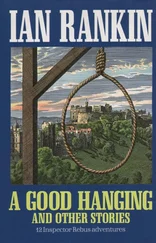“Leave me be,” the child said in a high irritated voice. “Leave me be. Just leave me be. I ain’t you,” and she went off to the woods as if she were stalking out an enemy, her head thrust forward and each hand gripped on a gun.
Mrs. Pritchard came over, sour-humored, because she didn’t have anything calamitous to report. “I got the misery in my face today,” she said, holding on to what she could salvage. “Theseyer teeth. They each one feel like an individual boil.”
The child crashed through the woods, making the fallen leaves sound ominous under her feet. The sun had risen a little and was only a white hole like an opening for the wind to escape through in a sky a little darker than itself, and the tops of the trees were black against the glare. “I’m going to get you,” she said. “I’m going to get you one by one and beat you black and blue. Line up. LINE UP!” she said and waved one of the pistols at a cluster of long bare-trunked pines, four times her height, as she passed them. She kept moving, muttering and growling to herself and occasionally hitting out with one of the guns at a branch that got in her way. From time to time she stopped to remove the thorn vine that caught in her shirt and she would say, “Leave me be, I told you. Leave me be,” and give it a crack with the pistol and then stalk on.
Presently she sat down on a stump to cool off but she planted both feet carefully and firmly on the ground. She lifted them and put them down several times, grinding them fiercely into the dirt as if she were crushing some-thing under her heels. Suddenly she heard a laugh.
She sat up, prickle-skinned. It came again. She heard the sound of splashing and she stood up, uncertain which way to run. She was not far from where this patch of woods ended and the back pasture began. She eased toward the pasture, careful not to make a sound, and coming suddenly to the edge of it, she saw the three boys, not twenty feet away, washing in the cow trough. Their clothes were piled against the black valise out of reach of the water that flowed over the side of the tank. The large boy was standing up and the small one was trying to climb onto his shoulders. Powell was sitting down looking straight ahead through glasses that were splashed with water. He was not paying any attention to the other two. The trees must have looked like green waterfalls through his wet glasses. The child stood partly hidden behind a pine trunk, the side of her face pressed into the bark.
“I wish I lived here!” the little boy shouted, balancing with his knees clutched around the big one’s head.
“I’m goddam glad I don’t,” the big boy panted, and jumped up to dislodge him.
Powell sat without moving, without seeming to know that the other two were behind him, and looked straight ahead like a ghost sprung upright in his coffin. “If this place was not here any more,” he said, “you would never have to think of it again.”
“Listen,” the big boy said, sitting down quietly in the water with the little one still moored to his shoulders, “it don’t belong to nobody.”
“It’s ours,” the little boy said.
The child behind the tree did not move.
Powell jumped out of the trough and began to run. He ran all the way around the field as if something were after him and as he passed the tank again, the other two jumped out and raced with him, the sun glinting on their long wet bodies. The big one ran the fastest and was the leader. They dashed around the field twice and finally dropped down by their clothes and lay there with their ribs moving up and down. After a while, the big one said hoarsely, “Do you know what I would do with this place if I had the chance?”
“No, what?” the little boy said and sat up to give him his full attention.
“I’d build a big parking lot on it, or something,” he muttered.
They began to dress. The sun made two white spots on Powell’s glasses and blotted out his eyes. “I know what let’s do,” he said. He took something small from his pocket and showed it to them. For almost a minute they sat looking at what he had in his hand. Then without any more discussion, Powell picked up the suitcase and they got up and moved past the child and entered the woods not ten feet from where she was standing, slightly away from the tree now, with the imprint of the bark embossed red and white on the side of her face.
She watched with a dazed stare as they stopped and collected all the matches they had between them and began to set the brush on fire. They began to whoop and holler and beat their hands over their mouths and in a few seconds there was a narrow line of fire widening between her and them. While she watched, it reached up from the brush, snatching and biting at the lowest branches of the trees. The wind carried rags of it higher and the boys disappeared shrieking behind it.
She turned and tried to run across the field but her legs were too heavy and she stood there, weighted down with some new unplaced misery that she had never felt before. But finally she began to run.
Mrs. Cope and Mrs. Pritchard were in the field behind the barn when Mrs. Cope saw smoke rising from the woods across the pasture. She shrieked and Mrs. Pritchard pointed up the road to where the child came loping heavily, screaming, “Mama, Mama, they’re going to build a parking lot here!”
Mrs. Cope began to scream for the Negroes while Mrs. Pritchard, charged now, ran down the road shouting. Mr. Pritchard came out of the open end of the barn and the two Negroes stopped filling the manure spreader in the lot and started toward Mrs. Cope with their shovels. “Hurry, hurry!” she shouted. “Start throwing dirt on it!” They passed her almost without looking at her and headed off slowly across the field toward the smoke. She ran after them a little way, shrilling, “Hurry, hurry, don’t you see it! Don’t you see it!”
“It’ll be there when we git there,” Culver said and they thrust their shoulders forward a little and went on at the same pace.
The child came to a stop beside her mother and stared up at her face as if she had never seen it before. It was the face of the new misery she felt, but on her mother it looked old and it looked as if it might have belonged to anybody, a Negro or a European or to Powell himself. The child turned her head quickly, and past the Negroes’ ambling figures she could see the column of smoke rising and widening unchecked inside the granite line of trees. She stood taut, listening, and could just catch in the distance a few wild high shrieks of joy as if the prophets were dancing in the fiery furnace, in the circle the angel had cleared for them.
A Late Encounter With the Enemy
General Sash was a hundred and four years old. He lived with his granddaughter, Sally Poker Sash, who was sixty-two years old and who prayed every night on her knees that he would live until her graduation from college. The General didn’t give two slaps for her graduation but he never doubted he would live for it. Living had got to be such a habit with him that he couldn’t conceive of any other condition. A graduation exercise was not exactly his idea of a good time, even if, as she said, he would be expected to sit on the stage in his uniform. She said there would be a long procession of teachers and students in their robes but that there wouldn’t be anything to equal him in his uniform. He knew this well enough without her telling him, and as for the damm procession, it could march to hell and back and not cause him a quiver. He liked parades with floats full of Miss Americas and Miss Daytona Beaches and Miss Queen Cotton Products. He didn’t have any use for processions and a procession full of schoolteachers was about as deadly as the River Styx to his way of thinking. However, he was willing to sit on the stage in his uniform so that they could see him.
Читать дальше









